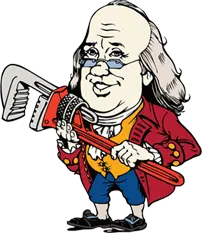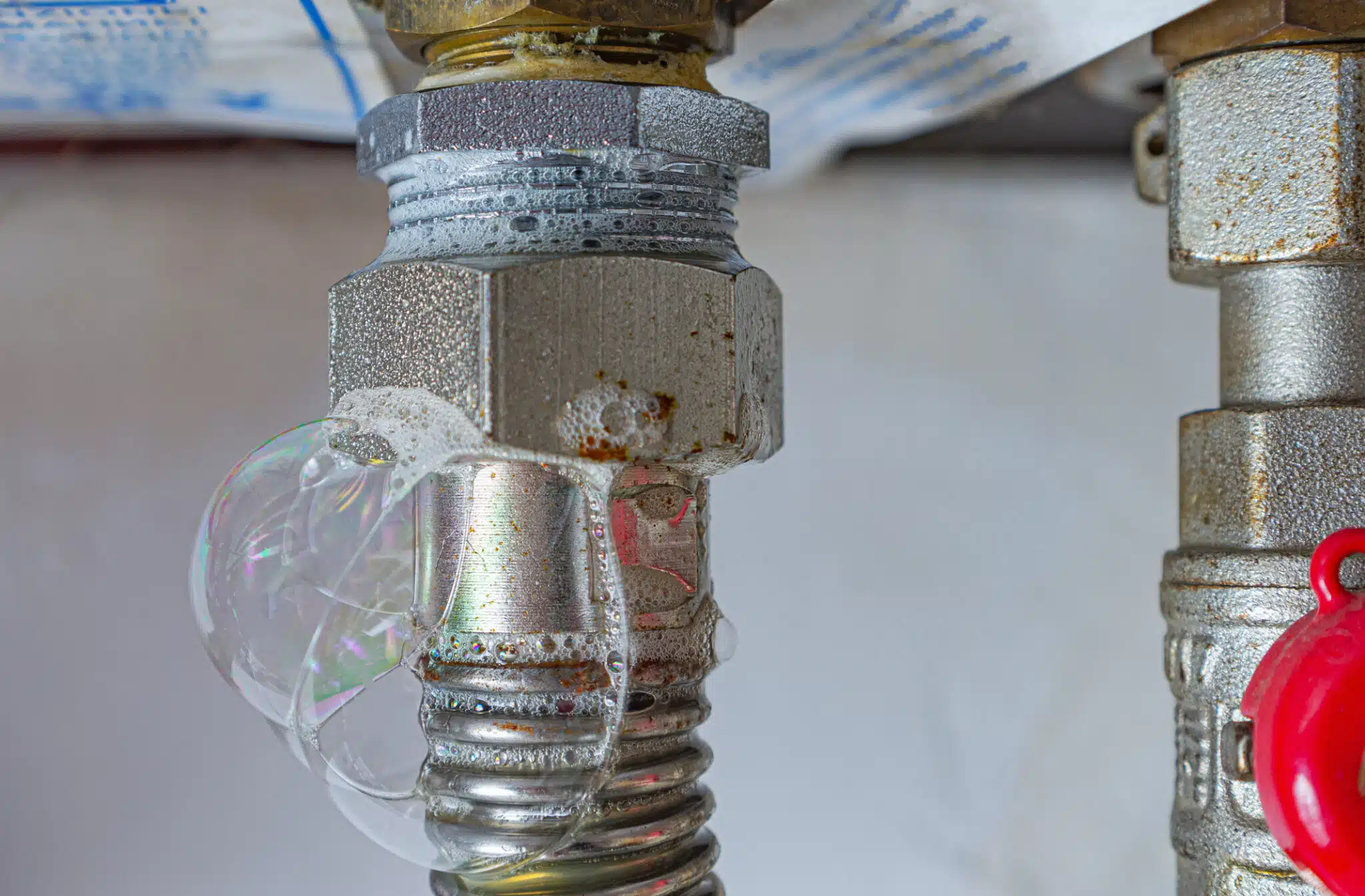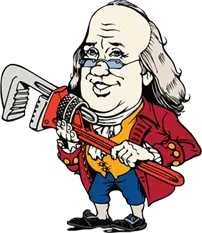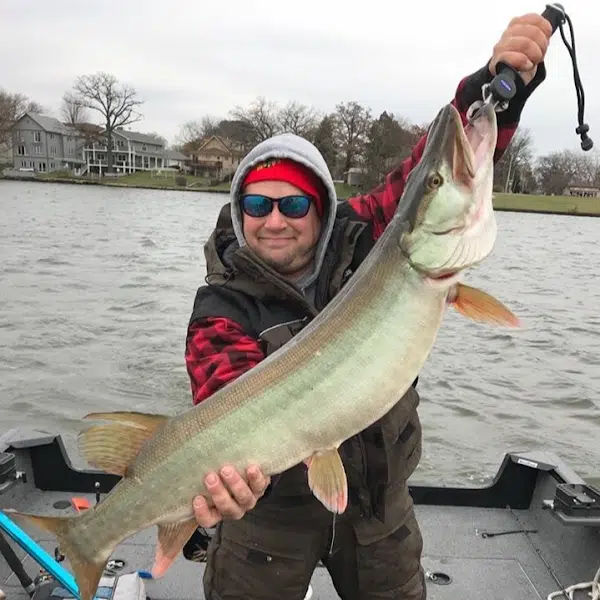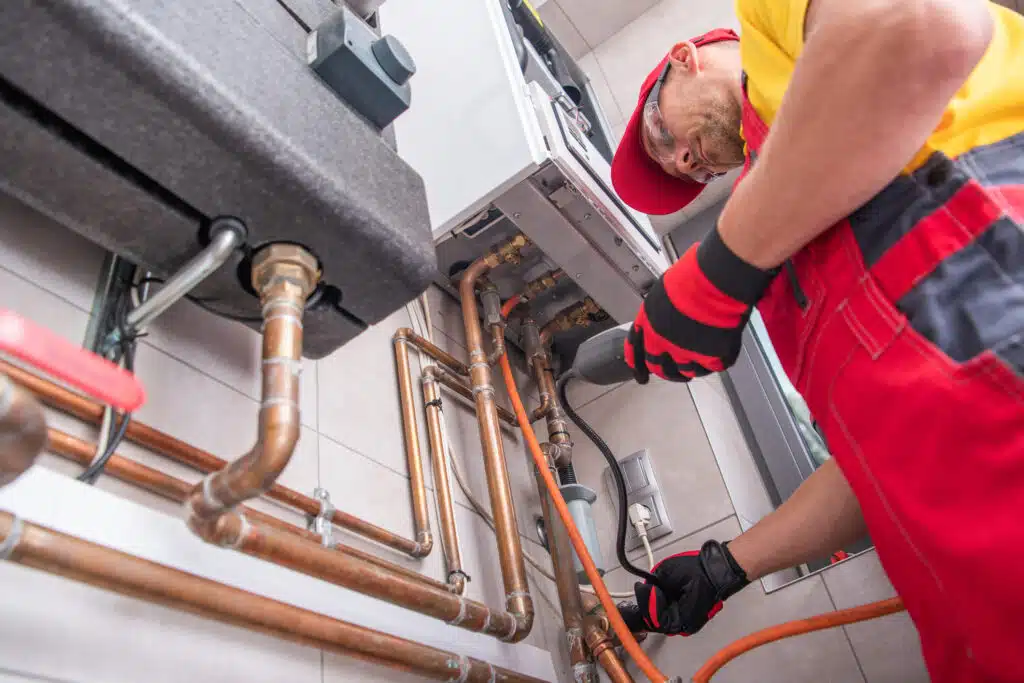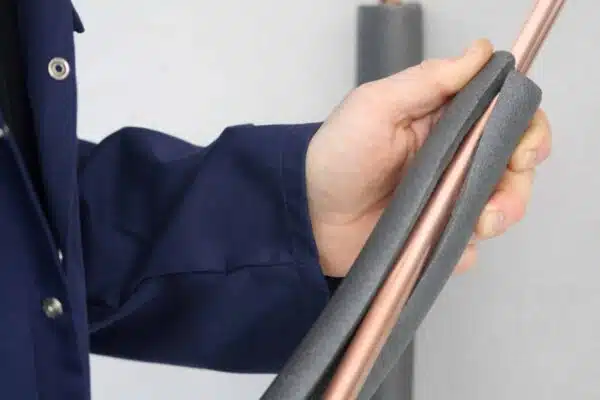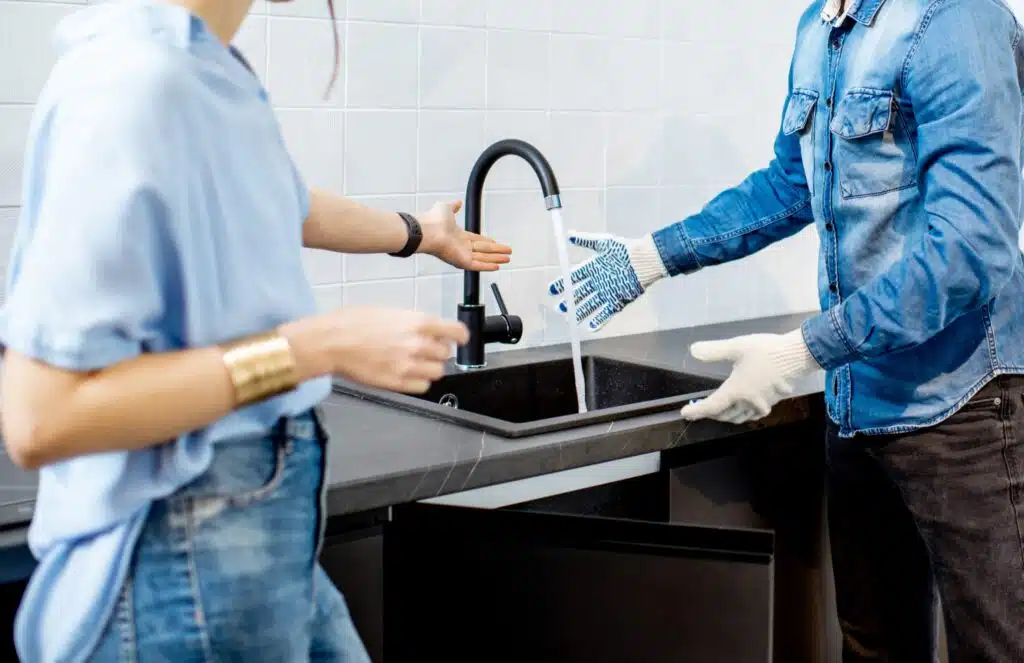Gas leaks are a serious problem in winter. They often happen because we use heating more or because freezing temps mess with gas lines. To stop gas leaks, check your heating system, look for damaged gas lines, keep good airflow, and use gas detectors. Always get a pro to inspect for safety. If you smell something like rotten eggs, act fast.
Gas Leaks: What Homeowners Need to Know
Gas leaks are more than an inconvenience—they can be dangerous if not handled quickly.
Winter is a particularly risky time for households in Harrisburg, PA, as heating systems and appliances are used more often.
Cold weather can cause pipes to shrink, crack, or separate at the joints, potentially allowing gas to escape into your home.
Natural gas itself is colorless and odorless, making detection difficult.
To aid in identifying potential leaks, a chemical called mercaptan is added, giving the gas a strong, rotten egg or skunk-like smell as a clear warning.
Beyond health concerns, natural gas also poses environmental risks.
Methane, a primary component, traps heat in the atmosphere and contributes more harm to the environment than carbon dioxide.
If you suspect a gas leak, evacuate the area immediately and reach out to a licensed professional for assistance.
Experts such as Benjamin Franklin Plumbing of Lancaster are equipped to perform detailed inspections and make repairs to keep your home safe.
Scheduling regular maintenance is another key step to preventing potential issues and ensuring peace of mind throughout the year.
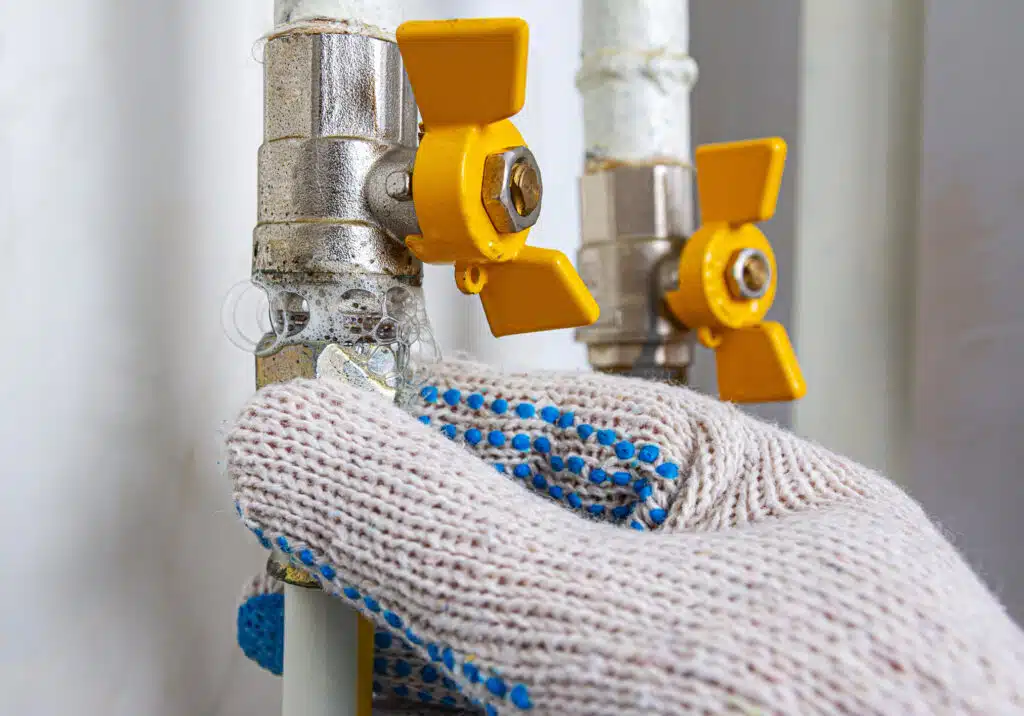
Why Gas Leaks Happen More in Winter
Gas leaks are more common in winter, and it’s easy to see why.
With heating systems working non-stop, the extra strain on appliances increases the chance of wear and tear on gas lines.
Furnaces, water heaters, and fireplaces are used more to keep homes warm, and even small cracks or issues in these systems can cause dangerous leaks.
While you’re staying cozy indoors, it’s easy to miss these hidden risks.
Freezing weather is another problem.
The cold can make lines contract, which might cause cracks or leaks.
If you spot frost on pipes or hear a hissing sound in outdoor areas, it’s time to contact a professional immediately.
Snow and ice can also block important vents, creating dangers that are often missed during winter storms.
Winter isn’t just about cold air—it brings risks to your home’s systems too.
Regular checks from experts near Harrisburg, PA, like Benjamin Franklin Plumbing of Lancaster, can keep your home safe, warm, and free of gas leaks all season long.
It’s always better to prevent problems than react to them later!
Signs of a Gas Leak to Watch For
Gas leaks are dangerous, so it’s crucial to spot the warning signs early.
The most obvious sign is a strong, bad smell. It’s often compared to rotten eggs or a skunk because of the additive in natural gas.
If you notice this odor in your Harrisburg, PA home, don’t ignore it.
Be aware of other potential indicators like appliance issues, such as pilot lights that keep going out or behave strangely.
Additionally, physical symptoms can also be a warning. If you or your family feel unwell indoors — like headaches, nausea, dizziness, or unusual fatigue — this could point to a gas leak.
Even your houseplants can give clues: if they start to wither for no apparent reason, it might warrant further investigation.
Finally, check for hissing sounds near gas lines or appliances and examine your pipes for damage.
Even a small crack in a pipe poses a risk.
If you notice any of these signs of a gas leak, contact professionals like Benjamin Franklin Plumbing of Lancaster to ensure your home stays safe.
Important: If you suspect a gas leak, leave your home immediately, avoid using electrical devices, and contact emergency services or a gas company for assistance before calling in the professionals.
Winter Maintenance Tips to Stop Gas Leaks
Winter isn’t the time to take risks with your home’s safety.
Keep your gas systems in check by scheduling regular professional maintenance.
Start with an inspection from a trusted expert, like Benjamin Franklin Plumbing of Lancaster.
A qualified plumber can spot issues before they turn into dangers.
Have any exposed gas lines on your property, especially outside, assessed by a professional.
Freezing temperatures can crack or weaken them over time.
Don’t ignore rust or wear—these are warning signs of potential problems with your system.
Addressing small issues with a trained professional now can save you from larger, costly repairs later.
Watch the weather too.
Snow, ice, and debris can block outdoor vents, causing pressure buildup or poor ventilation.
Regular checks during heavy snow or storms can help prevent these problems, but always seek professional guidance if you suspect an issue.
If your appliances are older, it might be time to consult a professional about upgrading to newer models.
Modern systems often have enhanced safety features that reduce the likelihood of gas leaks.
Pair these upgrades with gas detectors installed by an expert in Harrisburg, PA, and you’ll be one step ahead of winter problems, giving you peace of mind.
Install and Test Gas and Carbon Monoxide Detectors
If you’re concerned about gas leaks, gas and carbon monoxide detectors are essential for every home in Harrisburg, PA, especially during colder months when gas appliances are in frequent use.
These devices provide early warnings if natural gas or carbon monoxide (CO) levels become dangerous.
However, proper maintenance is just as important as installation to ensure they are functioning correctly.
Place detectors in key spots like bedrooms, hallways, and near gas appliances like stoves and furnaces.
For full protection, put one on every floor of your home.
Battery-operated detectors are convenient, but you’ll need to replace the batteries regularly.
A good reminder? Do it when daylight saving time starts and ends.
To test your detectors, press the “test” button.
If you hear a beep, it’s working.
If it’s silent, the detector may need new batteries or replacement.
For hardwired models, professional assistance may be needed to inspect connections or address malfunctions.
Your family’s safety is paramount.
Benjamin Franklin Plumbing of Lancaster recommends pairing detectors with professional inspections to ensure your home remains safe from gas leaks.
Stay safe and prepared year-round.
Keep Gas Appliances in Good Shape
Keeping your gas appliances in good working order isn’t just smart—it’s crucial for safety and efficiency, especially during cold winters in Harrisburg, PA.
Regular cleaning and checks are essential for preventing problems.
Dust or debris in your gas stove or furnace can clog parts, lower performance, and even increase the risk of hazardous situations.
A little maintenance now can save you from bigger issues later.
Watch for warning signs like odd smells (such as rotten eggs), uneven flames, or strange noises coming from your appliances.
These may indicate a problem that requires immediate attention.
Ignoring them could compromise your safety.
A professional inspection by experts like Benjamin Franklin Plumbing of Lancaster can help Harrisburg homeowners avoid problems.
Their licensed plumbers thoroughly check all connections, burners, and lines to ensure everything is functioning safely.
This simple step not only protects your family from potential gas leaks but also boosts energy efficiency, helping to keep your home warm without unnecessary energy waste.
Why Professional Gas Line Inspections Matter
When it comes to gas safety, there’s no room for shortcuts.
Gas leaks can cause serious harm to your home and family, but professional gas line inspections offer peace of mind—especially during the cold winters in Harrisburg, PA.
Skilled plumbers, like the team at Benjamin Franklin Plumbing of Lancaster, have the tools and training to find issues that most people wouldn’t notice.
Winter weather puts extra strain on gas lines.
Cold temperatures can make pipes shrink, which may lead to cracks or joint problems.
Regular inspections catch these issues before they turn into emergencies.
Pros can spot early signs of trouble, like corrosion or weak spots, that might go unnoticed by homeowners.
How often should you get inspections?
While recommendations can vary, many homeowners find peace of mind by scheduling annual gas line inspections.
Consulting a licensed professional ensures that your home complies with current safety standards and reduces risks associated with heavy winter gas use.
Don’t wait for dangerous gas leaks to alert you to danger—being proactive can save lives.
Trust local experts who care about keeping your Harrisburg home safe, warm, and stress-free this winter.
Proper Ventilation: A Key Defense Against Gas Leaks
In Harrisburg, PA, where winters are cold, it’s easy to forget how important proper ventilation is for maintaining safety in areas with gas appliances.
But keeping air moving in spaces with these appliances is crucial for your family’s protection.
Without enough airflow, dangerous situations could arise due to the accumulation of gases.
Make sure vents in areas like the kitchen and laundry room remain unobstructed.
Snow, ice, or leaves can block exterior vents, reducing airflow and potentially allowing gases to become trapped indoors.
For instance, if your gas dryer or water heater vent becomes blocked, harmful substances such as carbon monoxide could re-enter your home.
Interior airflow is equally critical.
Avoid obstructing return air vents or grilles near gas-powered appliances.
Poor air circulation may not seem immediately concerning, but it can silently contribute to conditions where gases build up and pose a risk.
Lastly, ensure that exhaust fans and range hoods are in proper working order.
These systems play a vital role by venting harmful gases, making them part of your first line of defense.
If you’re unsure about the effectiveness of your ventilation systems, contact Benjamin Franklin Plumbing of Lancaster.
Their experts can thoroughly inspect your home to ensure it remains safe and comfortable during Harrisburg’s chilly winters.
Tips for Safe Use of Portable Heaters
Portable heaters can keep you warm in winter, but they need to be used safely—especially if they’re gas-powered.
Place your heater in a spot away from curtains, furniture, or anything that could catch fire.
Think of it as giving your heater its own “personal space” to avoid accidents.
Don’t block its vents, as this could cause it to overheat or restrict airflow.
If you’re using a gas-powered heater in Harrisburg, PA, make sure the room has good airflow.
Gas heaters use up oxygen and can produce carbon monoxide, which is dangerous and has no smell.
To keep your home safe, ensure adequate ventilation by following the manufacturer’s instructions.
Check the label to confirm the heater is safe for indoor use—some models are only meant for outdoor use and can pose serious safety risks indoors.
Make it a habit to inspect your heater often.
Look for cracks, wear, or damage on hoses or connectors—these are common culprits behind gas leaks.
If you notice anything unusual, like a smell of rotten eggs, a flickering pilot light, or uneven heat, turn it off immediately and contact a licensed professional like Benjamin Franklin Plumbing of Lancaster.
Acting quickly ensures your home remains safe and comfortable all winter long.
How to Shut Off Your Gas in an Emergency
If you suspect gas leaks, knowing how to turn off your gas can keep your family safe.
Acting quickly and doing it right can lower the risk while you wait for help from Benjamin Franklin Plumbing of Lancaster.
Here’s what you need to know:
- Locate the Gas Meter Shut-Off Valve – The valve is typically located outside near the gas meter. In some homes in Harrisburg, PA, it might be inside, such as in the basement or a utility area.
- Identify the Valve Handle – Look for a rectangular or lever-style handle. When the handle is in line with the pipe, the gas is on. To shut it off, the handle needs to be turned so it is perpendicular to the pipe.
- Use a Wrench or Gas Shut-Off Tool – Keep a crescent wrench or a gas shut-off tool in an easily accessible location near your gas meter for emergencies.
- Turn the Valve Off – Carefully turn the handle a quarter turn until it is perpendicular to the pipe. This will stop the flow.
Never attempt to turn the gas back on yourself.
Contact a licensed professional for assistance.
Working with gas systems without proper training can lead to dangerous consequences, so trust Benjamin Franklin Plumbing of Lancaster to handle the situation safely and efficiently.
What Not to Do If You Think There’s a Gas Leak
If you suspect gas leaks, don’t try to handle the situation yourself. This could be dangerous and turn a small issue into a serious emergency.
Don’t try to find the source of the leak on your own. Even tiny sparks, like flipping a light switch, can ignite the gas. Avoid using appliances, phones, or anything that could create heat or friction.
It might seem like a good idea to open windows for ventilation, but it’s crucial to leave the house as-is and avoid actions that might worsen the situation or cause an ignition.
Also, never attempt to repair gas lines on your own. Without proper training, you risk escalating the problem or causing further damage.
If you suspect a gas leak, exit your home immediately. Leave the doors open on your way out, but do not stay inside.
Once you’ve reached a safe distance, contact emergency services or a trusted professional, such as Benjamin Franklin Plumbing of Harrisburg, PA, to resolve the issue safely and effectively.
Your safety is the top priority. Don’t take unnecessary risks—allow qualified technicians in Harrisburg, PA, to ensure your home is secure promptly and thoroughly.
Winter Energy Saving Tips That Help Prevent Gas Leaks
Winter often means higher energy bills, but with a few simple changes, you can save energy and reduce the chance of dangerous leaks in your Harrisburg, PA home.
Small fixes and routine upkeep can keep you safe and warm.
Start by checking your heating system.
Have a pro, like Benjamin Franklin Plumbing of Lancaster, inspect it.
Dirty filters, worn seals, or cracks in gas lines can lead to serious problems or leaks.
Keeping your system clean and well-maintained reduces strain and improves how it works.
Use your thermostat wisely.
Lower it a few degrees when you’re asleep or out of the house to save energy.
Seal drafts around windows and doors to retain heat and prevent overworking your furnace.
This step not only cuts energy use but also lowers the chance of equipment failing.
If you have appliances like stoves or fireplaces powered by gas, check them regularly.
Issues like poor flame quality or blocked vents might signal a problem.
Make sure the area around these appliances is clear and well-ventilated to avoid blockages.
If you notice any warning signs, contact a professional immediately to assess the situation.
Stay safe and energy-efficient this winter—start today!

FAQs about Gas Leaks
What are the signs of gas leaks in winter?
Look out for a rotten egg or skunk-like smell, hissing sounds near gas lines, or sudden symptoms like dizziness or nausea. Poor appliance performance can also be a clue.
Can cold weather cause gas leaks in Harrisburg, PA?
Yes. Freezing temperatures can cause gas pipes to contract and become more vulnerable, which may lead to leaks. This is why professional inspections and maintenance are crucial for homeowners in regions like Harrisburg, PA.
How often should gas lines be checked?
It’s recommended to have your gas lines inspected regularly, at least annually. Certified plumbers, like those at Benjamin Franklin Plumbing of Lancaster, can help ensure your system remains safe and operates efficiently.
Do I really need gas and carbon monoxide detectors?
Yes, you do. These detectors provide critical early warning that can save lives if a gas or carbon monoxide issue arises. Place them in main living areas and test them regularly to ensure they’re functioning correctly.
What should I do if I think there’s a gas leak at home?
Leave the area immediately without using any electronics, light switches, or open flames. Contact professionals, such as Benjamin Franklin Plumbing of Lancaster, from a secure location to promptly address the gas leaks.




